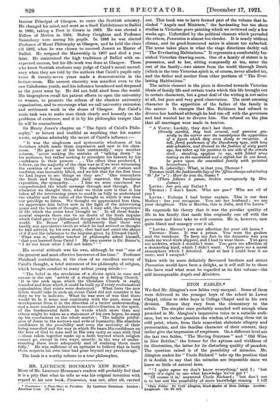MR. LAURENCE HOUSMAN'S NEW BOOK.* Mosx of Mr. Laurence Housman's
readers will probably feel that it is a pity that what he tells us was his original intention with regard to his new book, Possession, was not, after all, carried Jonathan Cape. [7a. dd. not.] Lougmana. 18a. 6d. net. out. This book was to have formed part of the volume that in- cluded " Angels and Ministers," the fascinating but too short studies in Victorian genre painting which we reviewed only a few weeks ago. Unfortified by the political element which pervaded the others, Possession is almost too slender. It is nearly without climax, and its good-humoured satire is almost too unbarbed. The scene takes place in what the stage directions darkly call " The Everlasting Habitations." It represents a comfortably fur- nished Victorian drawing-room. One of a family of sisters is in possession, and to her, sitting composedly at tea, enter the rest of the family—two sisters from the world through Death (which in the true Victorian spirit is, of course, never alluded to), and the father and mother from other portions of " The Ever-
lasting Habitations."
The satiric element in the piece is directed towards Victorian ideals of family life and certain traits which this life brought out in certain characters, but a great deal of the writing is not satire at all, but pure and very good observation. The most amusing character is the apparition of the father of the family in the mirror. It emerges that Mrs. Robinson had refused to divorce her husband although he had run off with the governess and had wanted her to divorce him. She refused on the plea that all marriages were made in heaven.
" A VOICE : Luckily, they don't last there. (Greatly startled, they look around, and perceive pre- sently in the mirror over the mantelpiece the apparition of a figure which they seem dimly to recognize. A tall, gentleman of the Dundreary type, with long side-whiskers, and dressed in the fashion of sixty years ago, has taken up his position to one side of the ormolu clock ; standing, eyeglass in. eye, with folded arms resting on the mantelslab and a stylish hat en one hand, he gazes upon the assembled family with quizzical benevolence.) Mits. R. (placidly): What, is that you, Thomas Drones (with the fashionable lisp of the 'fifties always substituting ' th ' for ') : How do you do, Susan ? (There follows a pause, broken courageously by Mrs. James.) LAURA : Are you my Father ? Thomas : I don't know. Who are you.' Who are all of you ?
Llama : Perhaps I had better explain. This is our dear Mother : her you recognize. You are her husband ; we are your daughters. This is Martha, this is Julia, and I'm Laura."
He expounds his theory that it was the peculiar quality of life in his family that made him originally run off with the governess and later take to evil courses. He is, however, now quite bland and unangry over it all.
" Letrus : Haven't you any affection for your old home ?
THomes : None. It was a prison. You were the gaolers and the turnkeys. To keep my feet in the domestic way you made me wool-work slippers, and I had to wear them. You gave me neckties, which I wouldn't wear. You gave me affection of a demanding kind, which I didn't want. You gave me a moral atmosphere which I detested. And at last I could bear it no more, and I escaped."
Taken with its more definitely flavoured brothers and sisters Possession would have been a delight, as it will still be to those who have read what must be regarded as its first volume—the still incomparable Angels and Ministers.






































 Previous page
Previous page